Unit 2 English around the world
文档属性
| 名称 | Unit 2 English around the world |

|
|
| 格式 | zip | ||
| 文件大小 | 5.6MB | ||
| 资源类型 | 教案 | ||
| 版本资源 | 人教版(新课程标准) | ||
| 科目 | 英语 | ||
| 更新时间 | 2012-10-12 00:00:00 | ||
图片预览

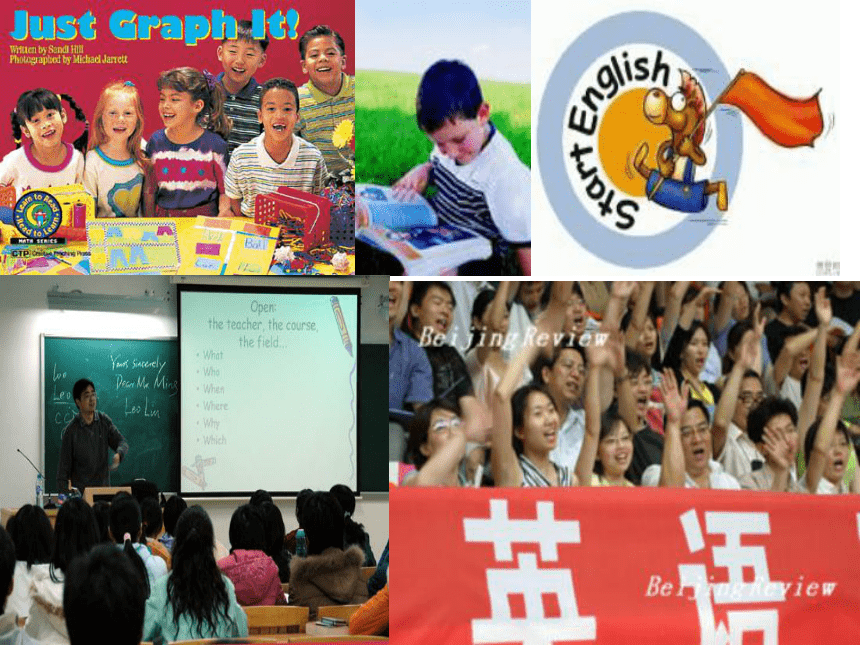
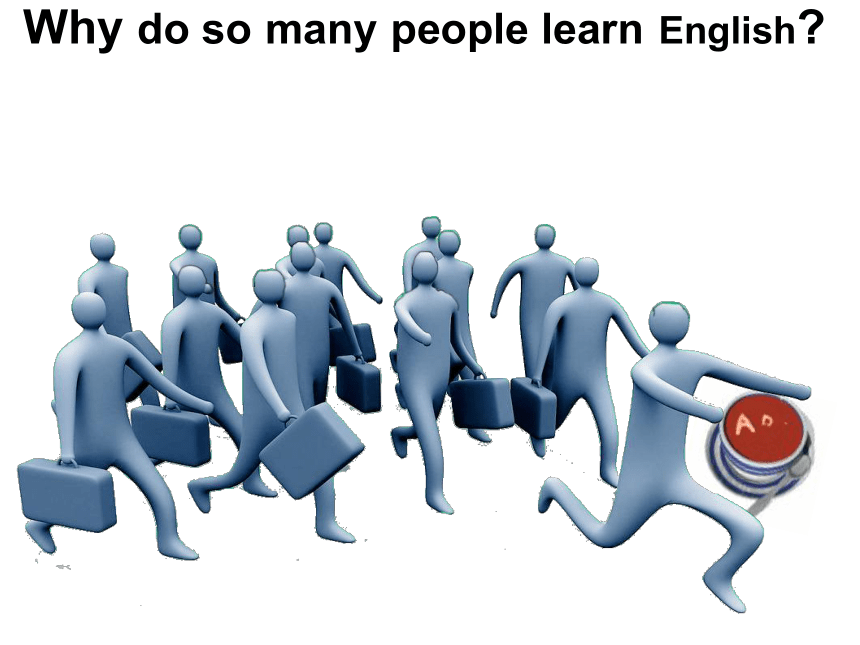
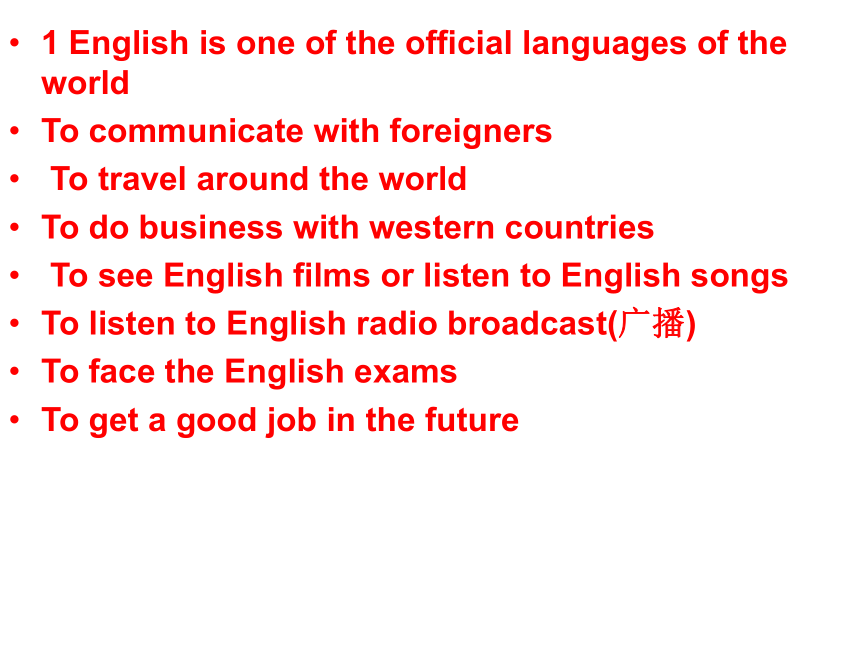
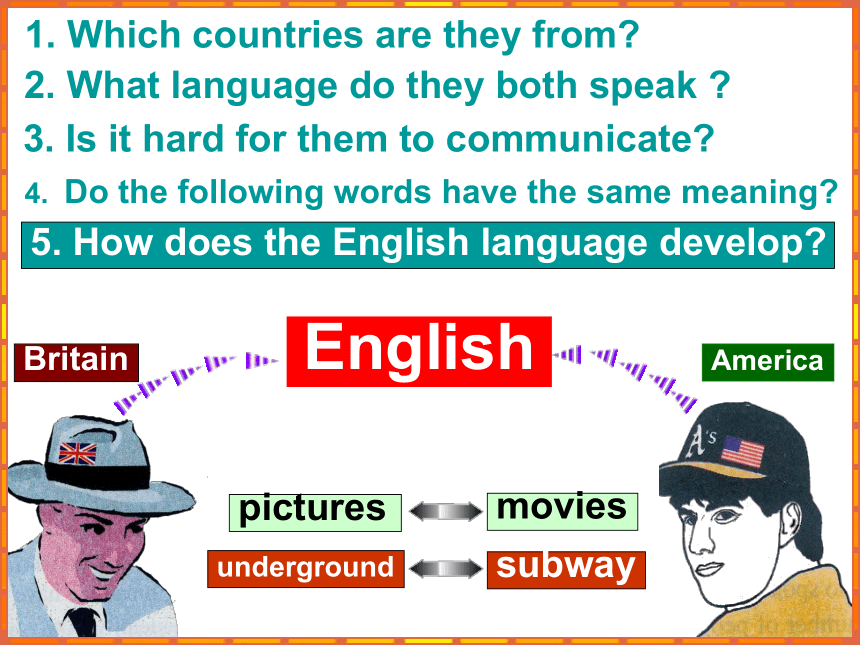
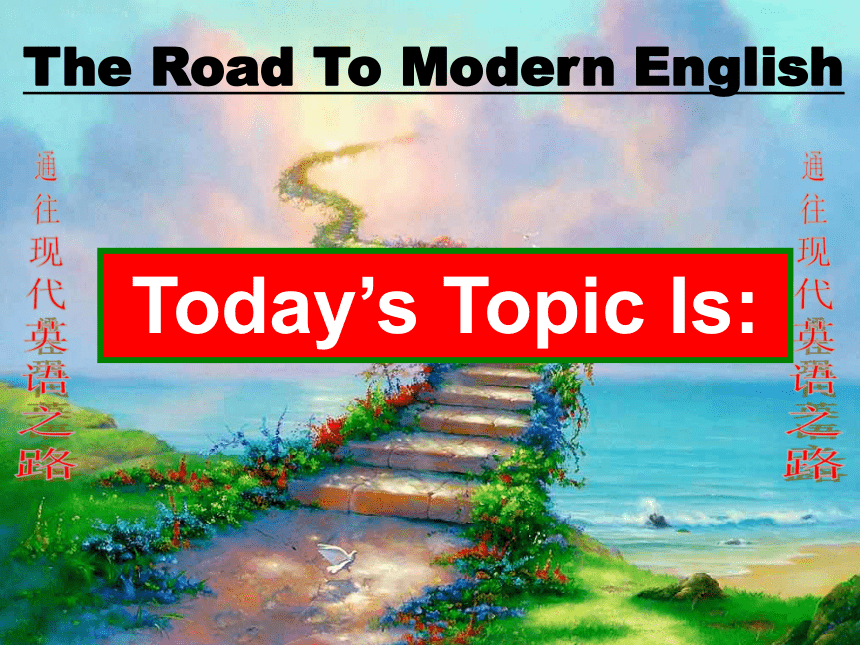
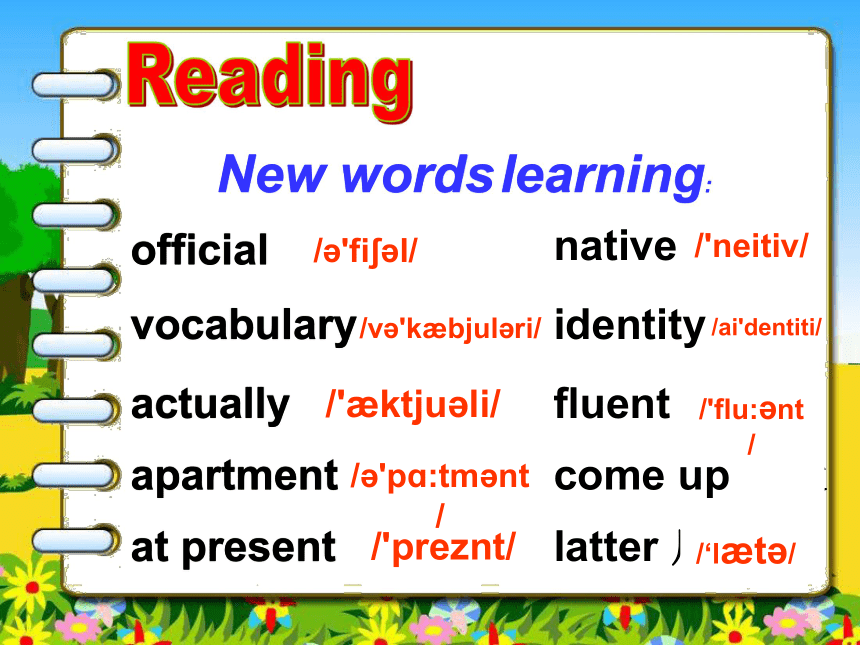
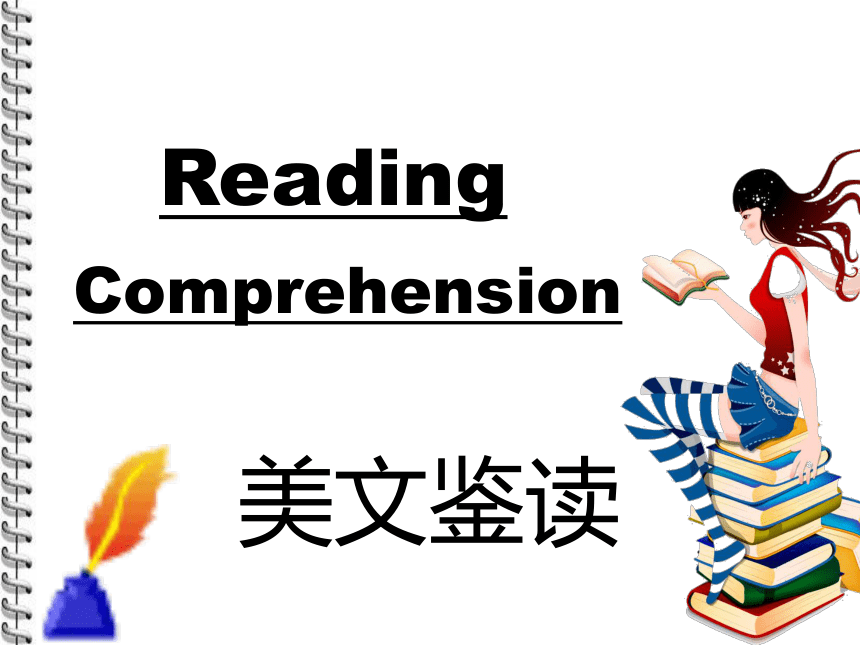
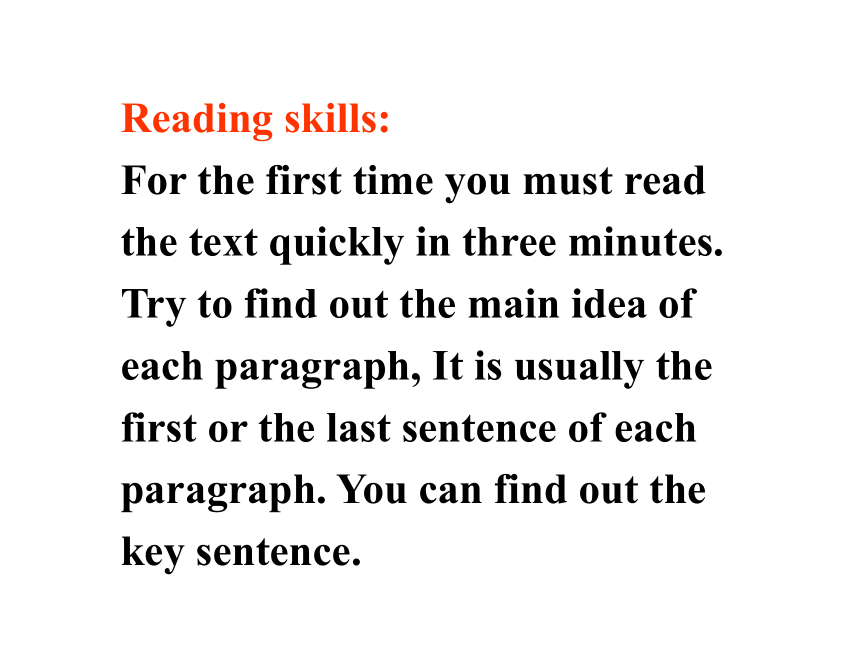
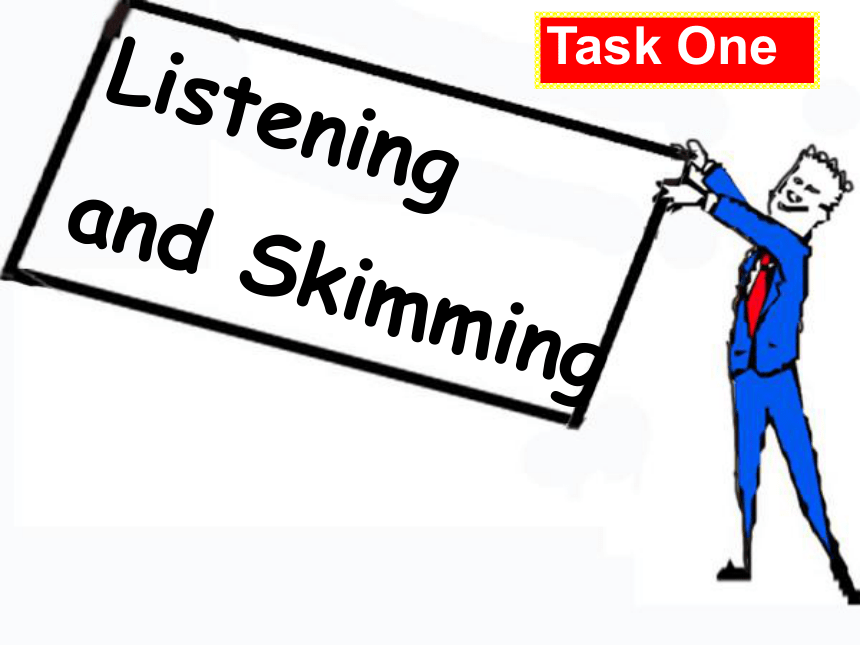
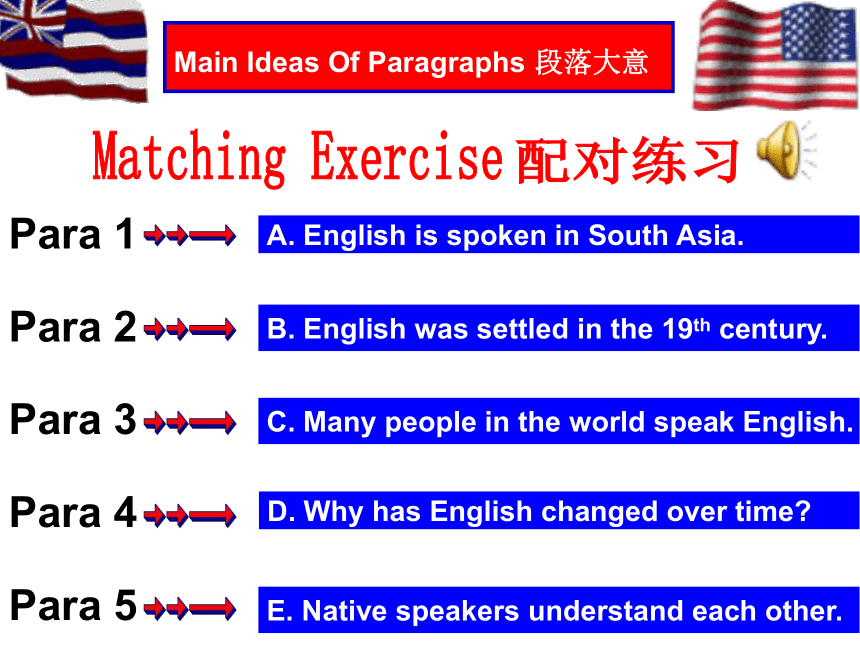
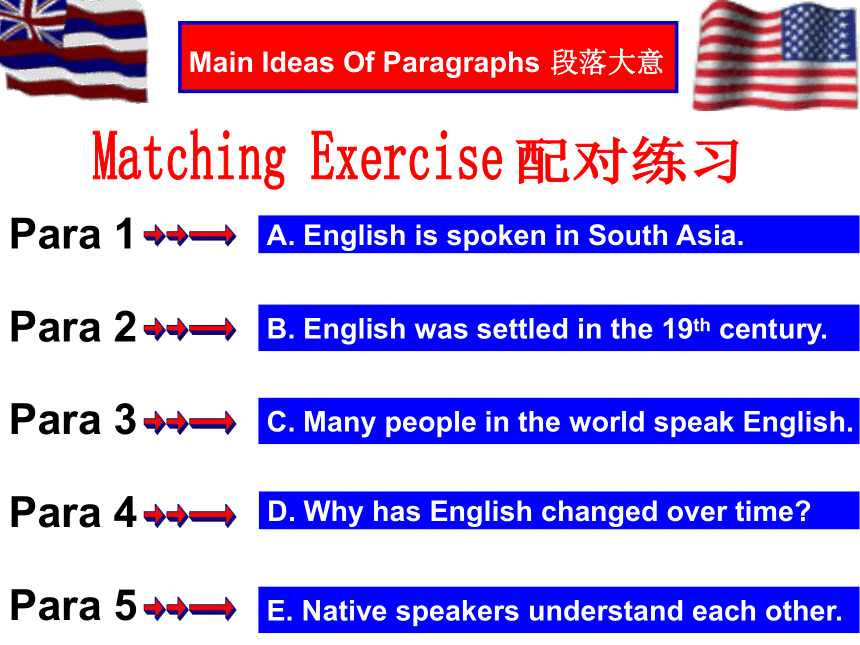
文档简介
(共41张PPT)
Why do so many people learn English
1 English is one of the official languages of the world
To communicate with foreigners
To travel around the world
To do business with western countries
To see English films or listen to English songs
To listen to English radio broadcast(广播)
To face the English exams
To get a good job in the future
underground
pictures
America
Britain
subway
movies
1. Which countries are they from
2. What language do they both speak
3. Is it hard for them to communicate
English
4. Do the following words have the same meaning
5. How does the English language develop
The Road To Modern English
Today’s Topic Is:
New words learning:
official 官方的
vocabulary 词汇
actually 实际上
at present 现在
apartment 公寓
native 本国的
identity 身份
fluent 流利的
come up 走近
latter 后者
/ 'fi l/
/'neitiv/
/v 'k bjul ri/
/ai'dentiti/
/' ktju li/
/'flu: nt/
/ 'pɑ:tm nt/
/'preznt/
/‘l t /
Reading
Comprehension
美文鉴读
Reading skills:
For the first time you must read the text quickly in three minutes. Try to find out the main idea of
each paragraph, It is usually the first or the last sentence of each paragraph. You can find out the key sentence.
Task One
Listening
and Skimming
D. Why has English changed over time
B. English was settled in the 19th century.
Para 1
Para 2
Para 3
Para 4
Para 5
E. Native speakers understand each other.
A. English is spoken in South Asia.
C. Many people in the world speak English.
Main Ideas Of Paragraphs 段落大意
D. Why has English changed over time
B. English was settled in the 19th century.
Para 1
Para 2
Para 3
Para 4
Para 5
E. Native speakers understand each other.
A. English is spoken in South Asia.
C. Many people in the world speak English.
Main Ideas Of Paragraphs 段落大意
Scanning
课文精读
Task Two
Decide whether the statement are True (T) or false (F) according to the passage and explain why.
1. English had the most speakers before the 17th century .
2. English developed when new settlers and rulers came to britain
3 Language frequently change.
4 The language of the government is always the language of the country.
5 English is one of the official languages used in India.
6 This reading describes the development of the English language
F
F
F
T
T
T
Detailed
Information
深层理解
Task Three
1. The First Paragraph Tells Us...
British English
American
English
Australian
English
English
--16世纪
6,000,000
English
(1800)
12,000,000
English
1900
50,000,000
English
(2020)
300,000,000
China
South Africa
India
1. The first Paragraph Tells Us...
More and more people speak
English.
2. The Second Paragraph Tells Us...
Shall we go to the pub for a drink
Wow, bar is a nice place.
Time to go,let’s go to the elevator together.
Oh,no.the lift must be full of people this time
3. The third Paragraph Tells Us...
More and more people speak
English.
Flow Chart To The Reading 阅读流程
2. Native speakers understand each other.
Read Para. 3 and find out why and how
English changed over time.
time
The development of English reasons
AD 450-1150
AD 800-1150
1600’s
1620
18th
based more on German
ruled by German
less like German
rulers spoke first Danish and
later French
had a wider vocabulary than before
Shakespeare
Was brought to American
British settlers moved
to America
Was brought to Australia
British people were taken
to Australia
3. The third Paragraph Tells Us...
3. Why has English changed over time
More and more people speak
English.
Flow Chart To The Reading 阅读流程
4. The Fourth Paragraph Tells Us...
2. Native speakers understand each other.
Noah
Webster
Samuel
Johnson
What did the two give to the world
Samuel VS Webster
控方Samuel:
I’m standard!
辩方Webster:
I am popular!
Judge: Who is the winner
英语词典
美语词典
PK
Tie 平局
JUDGE:No standard English
Samuel
Webster
4. The Fourth Paragraph Tells Us...
4. English was settled in the 19th century.
5. The Fifth Paragraph Tells Us...
More and more people speak
English.
2. Native speakers understand each other.
3. Why has English changed over time
Flow Chart To The Reading 阅读流程
English
Indian-English 品尝印度英语
Which Asian country speaks English as their official and second language
A. India
B. Japan
Singapore English
Malaysia English
Chinese English
Do you know any other kinds of English
formed for this reason
South African English
How many
English learners are
there in China
2012
2005
2001
1995
1990
1983
5. The Fifth Paragraph Tells Us...
3. why has English changed over time
4. English was settled in the 19th century.
5. English is spoken in South Asia.
Flow Chart To The Reading 阅读流程
More and more people speak
English.
2. Native speakers understand each other.
Consolidation(巩固) Fill in the blanks with proper words according to the text.
The English between AD 450 and 1150 was based more on _______.
From AD 800 to 1150, those who ruled England spoke first _______ and later _______.
At the end of the 16th century, about _________________ people spoke English. Nearly all of them lived in England.
German
Danish
French
five to seven million
English is also spoken as a foreign or ______ language in many other countries in Africa and ___________.
Today, the number of people learning English in China is increasing _______. As a matter of fact, China may have the _______ number of English learners.
In 1620 some British settlers moved to ________. In the 18th century, some British people were taken to __________. English began to be spoken in both countries.
largest
America
Australia
second
South Asia
rapidly
Why did the writer decide to end the passage with a question
“Will Chinese English develop its own identity Only time will tell.”
Discussion
According to the passage, languages change when cultures communicate with one another. So the writer wanted to predict(预测) a possible road to modern English, that is, when Chinese culture communicates with English culture, English may change, too. So as time goes by, Chinese English may become one of the world English.
Homework
Review the passage after class.
Try to find out some language points in the passage.
See you later!
See you later!
Why do so many people learn English
1 English is one of the official languages of the world
To communicate with foreigners
To travel around the world
To do business with western countries
To see English films or listen to English songs
To listen to English radio broadcast(广播)
To face the English exams
To get a good job in the future
underground
pictures
America
Britain
subway
movies
1. Which countries are they from
2. What language do they both speak
3. Is it hard for them to communicate
English
4. Do the following words have the same meaning
5. How does the English language develop
The Road To Modern English
Today’s Topic Is:
New words learning:
official 官方的
vocabulary 词汇
actually 实际上
at present 现在
apartment 公寓
native 本国的
identity 身份
fluent 流利的
come up 走近
latter 后者
/ 'fi l/
/'neitiv/
/v 'k bjul ri/
/ai'dentiti/
/' ktju li/
/'flu: nt/
/ 'pɑ:tm nt/
/'preznt/
/‘l t /
Reading
Comprehension
美文鉴读
Reading skills:
For the first time you must read the text quickly in three minutes. Try to find out the main idea of
each paragraph, It is usually the first or the last sentence of each paragraph. You can find out the key sentence.
Task One
Listening
and Skimming
D. Why has English changed over time
B. English was settled in the 19th century.
Para 1
Para 2
Para 3
Para 4
Para 5
E. Native speakers understand each other.
A. English is spoken in South Asia.
C. Many people in the world speak English.
Main Ideas Of Paragraphs 段落大意
D. Why has English changed over time
B. English was settled in the 19th century.
Para 1
Para 2
Para 3
Para 4
Para 5
E. Native speakers understand each other.
A. English is spoken in South Asia.
C. Many people in the world speak English.
Main Ideas Of Paragraphs 段落大意
Scanning
课文精读
Task Two
Decide whether the statement are True (T) or false (F) according to the passage and explain why.
1. English had the most speakers before the 17th century .
2. English developed when new settlers and rulers came to britain
3 Language frequently change.
4 The language of the government is always the language of the country.
5 English is one of the official languages used in India.
6 This reading describes the development of the English language
F
F
F
T
T
T
Detailed
Information
深层理解
Task Three
1. The First Paragraph Tells Us...
British English
American
English
Australian
English
English
--16世纪
6,000,000
English
(1800)
12,000,000
English
1900
50,000,000
English
(2020)
300,000,000
China
South Africa
India
1. The first Paragraph Tells Us...
More and more people speak
English.
2. The Second Paragraph Tells Us...
Shall we go to the pub for a drink
Wow, bar is a nice place.
Time to go,let’s go to the elevator together.
Oh,no.the lift must be full of people this time
3. The third Paragraph Tells Us...
More and more people speak
English.
Flow Chart To The Reading 阅读流程
2. Native speakers understand each other.
Read Para. 3 and find out why and how
English changed over time.
time
The development of English reasons
AD 450-1150
AD 800-1150
1600’s
1620
18th
based more on German
ruled by German
less like German
rulers spoke first Danish and
later French
had a wider vocabulary than before
Shakespeare
Was brought to American
British settlers moved
to America
Was brought to Australia
British people were taken
to Australia
3. The third Paragraph Tells Us...
3. Why has English changed over time
More and more people speak
English.
Flow Chart To The Reading 阅读流程
4. The Fourth Paragraph Tells Us...
2. Native speakers understand each other.
Noah
Webster
Samuel
Johnson
What did the two give to the world
Samuel VS Webster
控方Samuel:
I’m standard!
辩方Webster:
I am popular!
Judge: Who is the winner
英语词典
美语词典
PK
Tie 平局
JUDGE:No standard English
Samuel
Webster
4. The Fourth Paragraph Tells Us...
4. English was settled in the 19th century.
5. The Fifth Paragraph Tells Us...
More and more people speak
English.
2. Native speakers understand each other.
3. Why has English changed over time
Flow Chart To The Reading 阅读流程
English
Indian-English 品尝印度英语
Which Asian country speaks English as their official and second language
A. India
B. Japan
Singapore English
Malaysia English
Chinese English
Do you know any other kinds of English
formed for this reason
South African English
How many
English learners are
there in China
2012
2005
2001
1995
1990
1983
5. The Fifth Paragraph Tells Us...
3. why has English changed over time
4. English was settled in the 19th century.
5. English is spoken in South Asia.
Flow Chart To The Reading 阅读流程
More and more people speak
English.
2. Native speakers understand each other.
Consolidation(巩固) Fill in the blanks with proper words according to the text.
The English between AD 450 and 1150 was based more on _______.
From AD 800 to 1150, those who ruled England spoke first _______ and later _______.
At the end of the 16th century, about _________________ people spoke English. Nearly all of them lived in England.
German
Danish
French
five to seven million
English is also spoken as a foreign or ______ language in many other countries in Africa and ___________.
Today, the number of people learning English in China is increasing _______. As a matter of fact, China may have the _______ number of English learners.
In 1620 some British settlers moved to ________. In the 18th century, some British people were taken to __________. English began to be spoken in both countries.
largest
America
Australia
second
South Asia
rapidly
Why did the writer decide to end the passage with a question
“Will Chinese English develop its own identity Only time will tell.”
Discussion
According to the passage, languages change when cultures communicate with one another. So the writer wanted to predict(预测) a possible road to modern English, that is, when Chinese culture communicates with English culture, English may change, too. So as time goes by, Chinese English may become one of the world English.
Homework
Review the passage after class.
Try to find out some language points in the passage.
See you later!
See you later!
